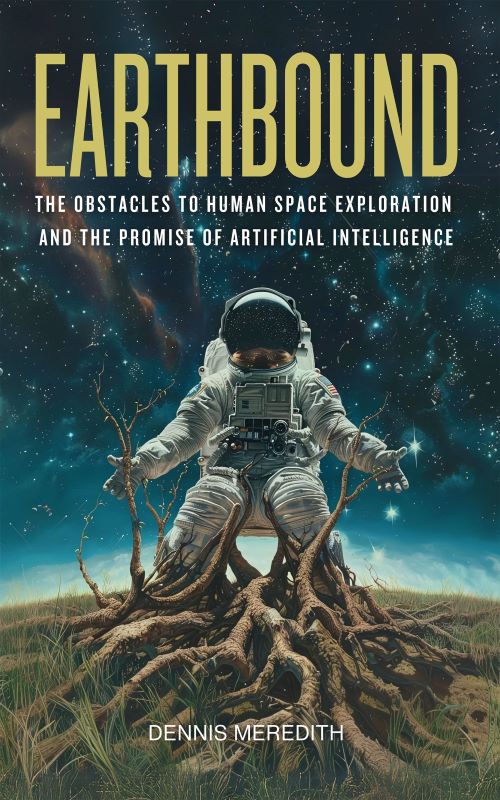Earthbound
The Obstacles to Human Space Exploration and the Promise of Artificial Intelligence
by Dennis Meredith
NASA and cosmic cheerleaders aim to send astronauts into a lethal hell of interplanetary space—ignoring insurmountable medical, economic, technological, political, and ethical obstacles.
Earthbound: The Obstacles to Human Space Exploration and the Promise of Artificial Intelligence details those obstacles—documenting the extensive research revealing that deep space is invariably deadly, due to radiation, weightlessness, isolation, disease, the toxic spacecraft atmosphere, and other dangers.

Earthbound instead advocates that deep-space exploration be mounted by neuronauts—artificially intelligent robots collaborating with scientists. Together, they could explore exotic realms from Martian caves to Europa’s oceans to Venus’s murky, superhot atmosphere. The data they gather could be used to create a Virtual Cosmos that all of humanity could explore, experiencing the wonders of the solar system.
The documented research detailed in Earthbound reveals that deep-space travel is a “serial killer,” as are lunar and Mars missions. That is, they are like the serial circuits of old-time Christmas tree lights, in which the loss of one defective bulb extinguished the entire string of lights. Similarly, in deep space, a lone medical catastrophe amid untold possibilities can end in death, or crippling. Any organ—heart, lungs, immune system, brain, or eyes—could fail. And the severe limits on medical capabilities in deep space would prevent treatment.
Likewise, in deep space, the loss of one spacecraft system—oxygen supply, temperature control, food, water, or radiation protection—means catastrophic failure, ending in death.
And in deep space, or on the moon or Mars, there is no option to quickly return to Earth. Reaching safety can be weeks or even years away.
The research also reveals that deep space is a "synergistic killer," in that these hazards could interact in ways that increase their lethality.
Earthbound reveals the political pressures that have driven the human deep-space program, including advocacy by NASA and cosmic cheerleaders—including self-serving politicians, profit-seeking aerospace corporations, billionaires with space visions, and naïve space travel enthusiasts. It explains how science fiction acts as propaganda, giving a false sense that human deep-space travel is feasible. In reality there is no magical gravity, instant food synthesis, radiation protection, or infinite fuel, as depicted in science fiction from Star Wars to Star Trek to The Martian.
The book also documents the many billions of dollars wasted on past and present human space programs. And it questions whether human deep-space travel is ethical, given its unavoidable hazards.
Articles:
Podcast: No Planet B: Why Mars is More Myth than Mission with Dennis Meredith